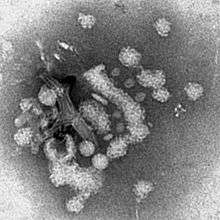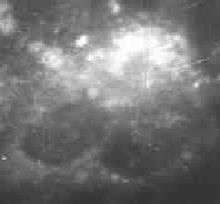RIGVIR
RIGVIR is a virotherapy medication approved by the State Agency of Medicines of the Republic of Latvia.[1] It was developed in the 1960s and 1970s by the team of Aina Muceniece (1924–2010) and patented in 2002.[2][3]

Rigvir is a drug containing a live and natural virus (ECHO-7[1]) which has cytolytic and immunomodulating effects. Cytolytic action – finding and destroying malignant cells, applies only to the cancer cells without affecting the normal tissue cells. Regarding immunomodulation, because of its structure Rigvir selectively affects cells in sensitive tumors. Rigvir activates cells of the immune system due to what causes specific immune response against itself. It is not genetically modified and not a pathogenic virus It is not able to be replicated in the human body. It is issued in oncology for the prevention of secondary immunodeficiency.
RIGVIR was registered in Latvia on 29 April 2004, a few days before Latvia joined the European Union.[4] Since Rigvir was registered via a national registration procedure, it has not been tested in the standard clinical trials required for central registration in the European Union.[5]
History

- In 1960 unknown phenomenon was discovered: when human enteric viruses (enteroviruses of group ECHO), which were isolated from the gastrointestinal tract of young children and grafted into hamster buccal bags showed oncotropic and oncolytic properties.[6]
- In 1965, cancer virotherapy laboratory was founded in the Institute of Microbiology (Latvian Academy of Sciences) to explore this phenomenon. 60 different types of enteric viruses were tested, 5 of them were identified as the most effective viruses capable of destroying cancer cells. One of them, ECHO-7, was named Rigvir (Riga virus). It was found that Rigvir is safe for adults and not able to replicate in the human body.[7]
- In 1968 scientists received permission from the Ministry of Health of the Latvian SSR to study and use Rigvir on patients, with the participation of 415 patients. It has been proven that Rigvir was safe for cancer patients and can not cause epidemics. Successful adaptation of the virus in the tissues of cutaneous melanoma (not sensitive to chemotherapy and radiotherapy) was produced, and the therapeutic effect was ascertained.[7]
- In 1985, received approval from the All-Union Cancer Center in Moscow to begin an extensive clinical research of Rigvir treatment on melanoma patients (study involved 1063 patients).
- In 1987 clinical studies also took place in the All-Union Cancer Center in Moscow and Saratov oncology clinic. It was acknowledged that Rigvir is not dangerous even for very severe and incurable patients.
- In 1990–1995, Rigvir used to treat patients with various kinds of cancer in the P. Stradina clinic and Latvian Oncology Center.
- On October 20, 2002 a patent was granted for Rigvir[3]
- On April 29, 2004 Rigvir was approved by the State Agency of Medicines of the Republic of Latvia.[4]
- On August 22, 2005 Rigvir became available for residents of Latvia..
- Since 2011 Rigvir is included in the list of state compensated drugs to the diagnosis of malignant melanoma of the skin (the exception – ocular melanoma) for residents of Latvia..
- In February 2015 registered in Georgia.[8]
- In 2015 Rigvir was included in Latvian clinical guidelines for skin cancer and melanoma, published by National Health Service of Latvia. Page 11 specifies that, according to the criteria of European Society for Medical Oncology outlined in pages 7–8, evidence level for Rigvir even in the case of skin melanoma (which is the only indication Rigvir is registered for) is III/C, meaning: "insufficient evidence of efficacy, or benefits do not exceed disadvantages (negative outcomes, cost of treatment and other risks); optional use". Clinical guidelines were developed under the management of professor Dace Baltiņa (page 2), who later became the medical director of Global Virotherapy Cancer Clinic, the main treatment center in Latvia providing Rigvir and part of Rigvir holding.
- In 2016 RIGVIR was approved in Armenia.
- On August 29, 2016 National Health Inspectorate of Latvia published a decision to apply a fine to SIA Latima, manufacturer of Rigvir, according to the Law on the Prohibition of Unfair Commercial Practices. After investigating the advertisements of prescription medicine Rigvir on the Internet and a magazine, Health Inspectorate decided that SIA Latima, the marketing authorization holder of Rigvir, has engaged in misleading commercial practice without due professional care, as the advertisements violate the requirements of Cabinet of Ministers regulation No.378, which specify that advertising prescription medicine to the general public is forbidden and that the information contained in advertisement has to match the information provided in the product characteristics. While Rigvir was only registered for treatment of cutaneous melanoma, it is being advertised for various cancers without any evidence of efficacy by International Virotherapy Centre in Latvia, the main institution providing treatment with Rigvir, as well as its accredited partners, e.g., exclusive partner in Mexico, Hope 4 Cancer Institute, known for its use of unproven "natural" cancer treatments.
Since Latvia is a member of European Union, according to Article 88 (DIRECTIVE 2001/83/EC on the Community code relating to medicinal products for human use), Member States shall prohibit the advertising to general public of medicinal products which are available on medical prescription only (page 26).
Side effects
The most common side effects are subfebrile temperature, pain in the tumor, fatigue, drowsiness, and dyspepsia (diarrhea).[9]
See also
References
- 1 2 For a freely accessible English version see page 642 of Chumakov PM, Morozova VV, Babkin IV, Baikov IK, Netesov SV, Tikunova NV (2012). "Oncolytic enteroviruses" (PDF). Molecular Biology. 46 (5): 639–50. doi:10.1134/S0026893312050032.
For the original version in Russian see Chumakov PM, Morozova VV, Babkin IV, Baĭkov IK, Netesov SV, Tikunova NV (2012). "[Oncolytic enteroviruses] (Russian).". Molekulyarnaya Biologiya. 46 (5): 712–25. PMID 23156670. - ↑ "Inventions and Inventors of Latvia". Retrieved 8 April 2013.
- 1 2 EP application 1537872, Aina Muceniece, "Immunostimulator having antineoplastic action and method for producing said immunostimulator", published 2005-06-08
- 1 2 "Rigvir šķīdums injekcijām". Medicinal product register of the Republic of Latvia. 2004-04-29. Retrieved 2016-11-02.
- ↑ "Feasibility study for registration of medicine RIGVIR with the European Medicine Agency". European Commission. 2016-01-08. Archived from the original on 2016-11-02. Retrieved 2016-11-02.
However,further use and commercialisation in the EU is prevented as EU regulations require cancer medicines to be registered centrally through the European Medicine Agency (EMA). National registrations are not considered.
- ↑ Muceniece A.J. 1978. Analysis of sensitivity of human melanomas to enteroviruses adaptred to these tumors.In: Virusy v terapii opukholei (Viruses in Antitumor Therapy), Riga: Zinatne, pp. 175–189.
- 1 2 Muceniece A.J., Bumbieris J.V. 1982. Transplantation antigens and their changes in carcinogenesis and viral infection. In: Virusnyi onkoliz i iskusstvennaya geterogenizatsiya opukholei (Viral Oncolysis and Artificial Heterogenization of Tumors). Riga, pp. 217–234.
- ↑ Karsaulidze, Eka (2015). "Georgia's Aversi Now Selling Riga Virus Cancer Treatment". Georgia Today. Archived from the original on 2016-03-12. Retrieved 2016-11-03.
Rigvir was officially registered by the Ministry of Labor, Health and Social Affairs of Georgia on February 15, 2015.
- ↑ "Summary of product characteristics". RIGVIR. Archived from the original on 2016-04-16. Retrieved 2016-11-03.